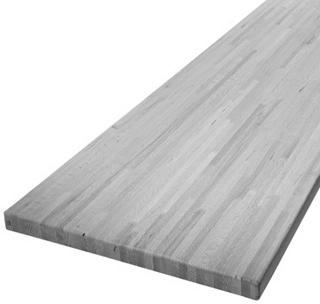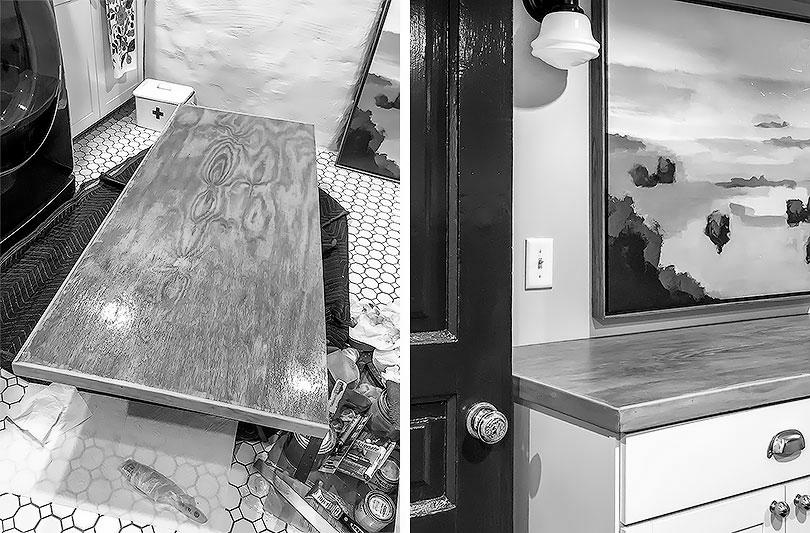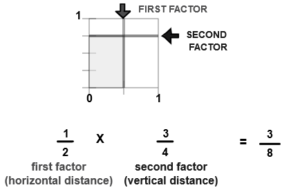If you’re considering installing a countertop in your kitchen, you’re probably wondering how thick it should be. While a standard thickness for plywood counter backer is 3/4 inches, you can choose a thicker material, depending on your personal preference. Generally, you’ll want your plywood to be 30 millimeters thick to ensure the strength of the finished product. Regardless of how thick your countertop is, you’ll want to leave at least 30 millimeters of material exposed.
The thickness of plywood is directly related to the type of countertop you’re building. For countertops that are short-term, an inch or half-inch thickness is sufficient. However, if you’re building a long countertop, you’ll need to use plywood that is at least half an inch thick. In general, countertops are made of one or two pieces of 19/32” plywood, though a double or triple layer of plywood is also recommended.
If you want to install a countertop without sacrificing strength, you should go with 3CM quartz, which provides the most flexibility when it comes to design. 3CM quartz slabs typically have the largest color selection and do not require any plywood underlayment or built-up laminated edge. The main downside to a 1CM quartz countertop is that it has a small factory-produced size range. On the other hand, 3CM slabs have unlimited sizes. If you’re building a countertop, 3CM quartz is the best choice because you can cut it yourself. It is a durable material and is also very strong.

It’s important to note that a higher thickness of plywood is more expensive than a thinner one. However, this thickness will provide a high-end look and a wider range of application options. You can also eliminate seams and use thicker countertops without any plywood backing. However, you should remember that a thicker countertop is generally not advisable if you don’t intend to use it for a long time.
Whether or not you need plywood for your quartz countertops depends on the thickness of your chosen surface. A good thickness for quartz countertops is 1.3 cm, and you can opt for two or three sheets of 5/8-inch plywood instead. You need an inch of substrate underneath the tiles to prevent cracks. Regardless of what countertop material you choose, make sure that you choose one with the appropriate support. The more support you have, the more sturdy your countertop will be.
If your countertop material is engineered stone, you may want to use plywood underneath it. This material is more vulnerable to heat and pressure than HPL, and it won’t stand up as well as solid-surface countertops will. Moreover, a thicker plywood will require more support. So, you should always choose plywood that is half-inch thick or even more. But, remember that plywood is expensive! If you do choose plywood, make sure that it’s marine-grade.

While countertops are functional workspaces, they can also be a feature of a home. For example, many modern homes are built with countertops that feature unusual, decorative surfaces. In addition to using natural stone for flooring, countertops can also be made from quartz, marble, or granite. But, while it can be a challenge to choose the right surface, it’s definitely worth the effort! So, how thick should plywood be for countertops?
How thick should countertops be wood?
This question as it depends on a number of factors, such as the type of wood, the intended use of the countertop, and the desired aesthetic. However, as a general rule, countertops should be at least 1.5 inches (3.8 cm) thick to be sturdy and durable enough for everyday use. Thicker countertops may be necessary for heavy–use areas, such as kitchens, while thinner countertops may be sufficient for lighter–use areas, such as bathrooms.
Ultimately, the thickness of a countertop should be determined by its intended use and the specific needs of the homeowner. For example, those who plan to do a lot of cooking may want to opt for a thicker countertop that can withstand frequent chopping and slicing, while those who simply want a countertop for decoration may be satisfied with a thinner option. No matter what, wood countertops add a warm, natural look to any home and can be customized to match any décor.
Can I use plywood for kitchen countertop?
There are a lot of different materials that can be used for countertops, but one of the most popular is plywood. Plywood is a versatile material that can be used for a variety of different applications, including countertops. While it is not as durable as some other materials, it is still a good option for many people. There are a few things to keep in mind if you are considering using plywood for your countertop.
One of the most important things to consider is the thickness of the plywood. The thicker the plywood, the more durable it will be. However, thicker plywood is also more expensive. If you are on a budget, you may want to consider using a thinner plywood.
Another thing to keep in mind is the finish of the plywood. Some people prefer to use a finish that will protect the plywood from water and stains. Others prefer to use a finish that will show off the natural beauty of the wood. There are a variety of finishes available, so you will need to decide what is best for you.
If you are considering using plywood for your countertop, there are a few things to keep in mind. However, plywood is a versatile material that can be used for a variety of different applications. With a little bit of planning, you can use plywood to create a beautiful and durable countertop.
How thick should plywood be for quartz countertops?
Quartz countertops are a beautiful and durable option for kitchen and bathroom countertops. They are made from a mixture of natural quartz and man-made materials, and then formed into slabs. These slabs are then cut to size and installed on countertops.
Plywood is often used as a base for quartz countertops. It provides a stable surface for the quartz to be installed on, and can help to prevent cracking. But how thick should plywood be for quartz countertops?
There are a few things to consider when choosing the thickness of plywood for your quartz countertops. The first is the thickness of the quartz slab. Quartz comes in a variety of thicknesses, from 1/2 inch to 1 1/4 inches. The thicker the quartz, the thicker the plywood should be.
Another factor to consider is the weight of the quartz. Heavier quartz countertops will require thicker plywood to support them.
Finally, you’ll need to consider the type of installation you’re doing. If you’re installing the countertop yourself, you may be able to get away with thinner plywood. But if you’re hiring a professional, they may require thicker plywood to ensure a stable surface.
In general, 3/4 inch plywood is a good thickness for most quartz countertops. If you’re installing a particularly thick or heavy quartz slab, you may need to go up to 1 inch plywood. And if you’re hiring a professional for the installation, they may have their own requirements for plywood thickness.
What kind of plywood do you use under quartz countertops?
If you’re thinking about installing quartz countertops in your kitchen, you might be wondering what kind of plywood you need to use as a base. Here’s a quick guide to help you make the best choice for your project.
When it comes to choosing plywood for your quartz countertops, you have a few options. The most common type of plywood used is 3/4-inch thick, but you can also use 1/2-inch or 1-inch thick plywood. The thickness you choose will depend on the support you need and the weight of the quartz countertops.
If you’re working with a countertop that’s less than 50 pounds, you can get away with using 1/2-inch plywood. For countertops that are 50 pounds or more, you’ll need to use 3/4-inch plywood. And for particularly heavy countertops, you might even need to use 1-inch plywood.
When it comes to choosing the right type of plywood for your quartz countertops, there are a few things to keep in mind. First, make sure you select plywood that is void-free. This means that there are no holes or gaps in the wood that could cause the quartz to crack or break.
Second, choose a plywood that is rated for exterior use. This will ensure that it can withstand moisture and temperature changes without warping or breaking.
Finally, make sure the plywood you select is compatible with the adhesive you’ll be using. Some adhesives require a particular type of plywood, so be sure to check before making your purchase.
With these tips in mind, you should be able to choose the right plywood for your quartz countertops with ease.
Conclusion
We hope this blog post “How Thick Should Plywood Be For Countertops?” has helped clear up any confusion you may have had. If you have any further questions, feel free to reach out to us and we would be happy to help!
Hey check out: How What Size Drill Bit Do You Use For a 1/2 Inch Tap?
Today sponsors are Lifeafter20 and Sprinkler Repair Long Island
Also check out Handyman of Tulsa for your handy man needs.








